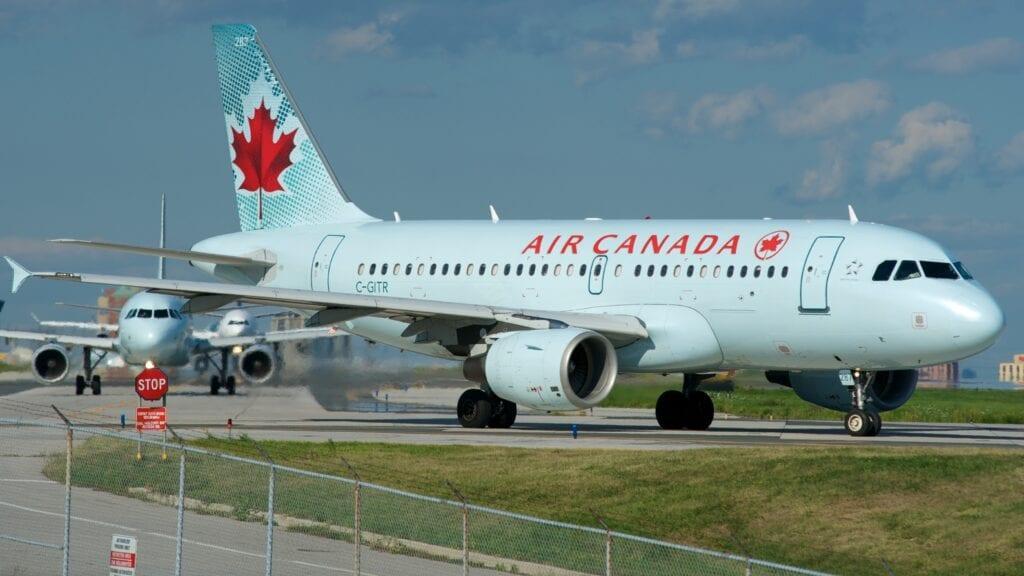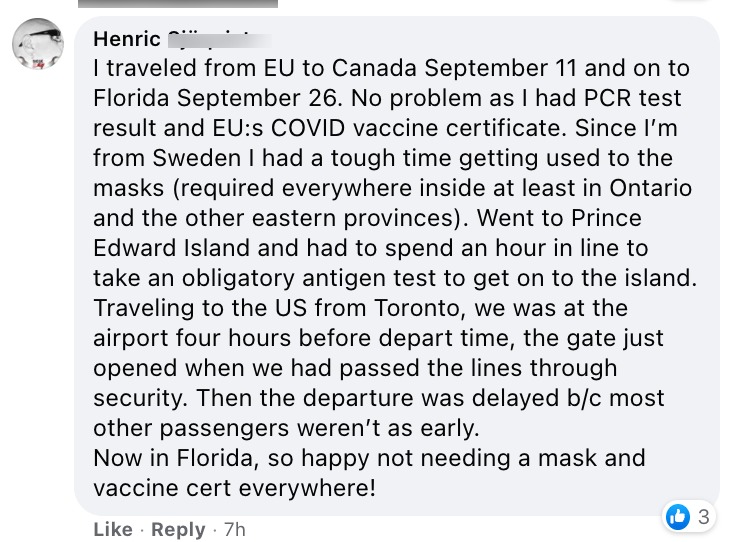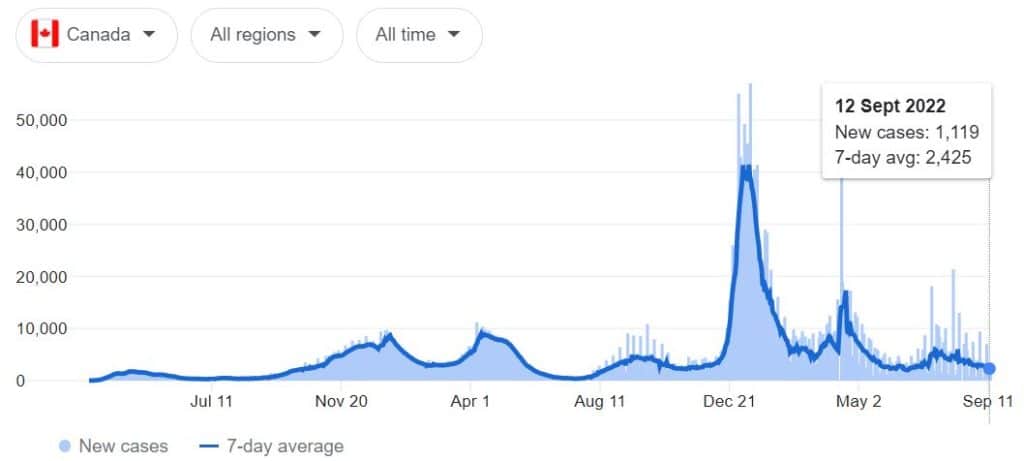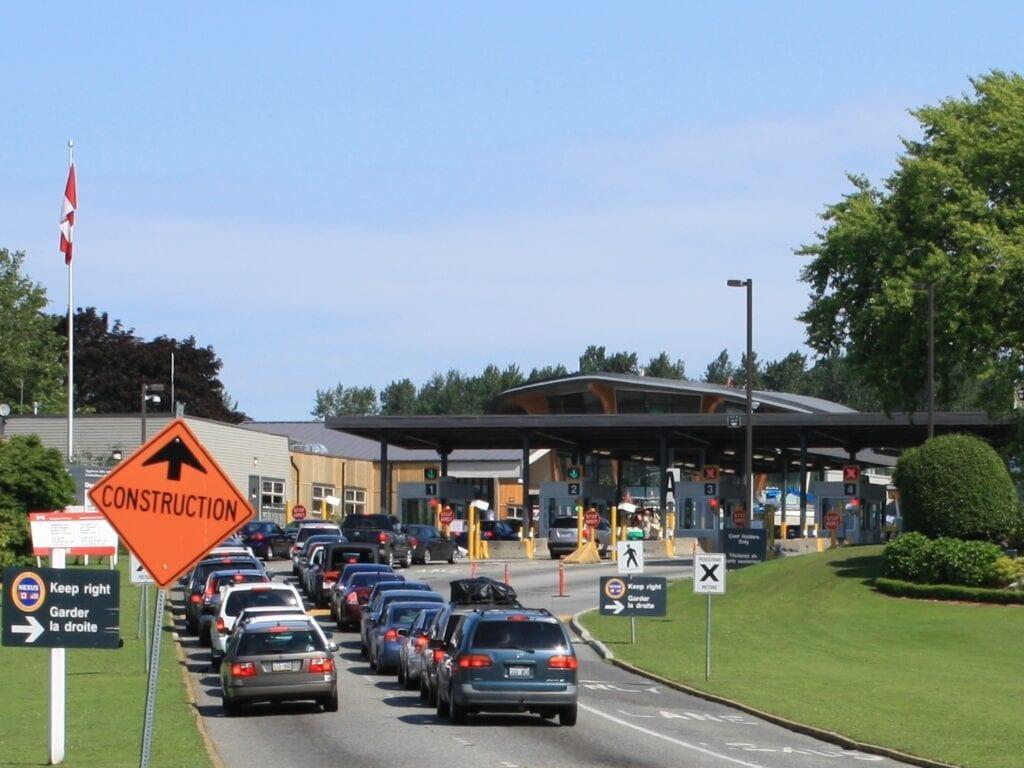Canada reopened borders for vaccinated tourists from most countries on September 7. U.S.-Canada land border reopened on Nov. 8.
To be eligible, visitors must meet a series of requirements as well as present proof of vaccination and a negative PCR COVID-19 test.
Disclaimer: Travel restrictions and governmental regulations can change rapidly and the information below might be outdated within a few hours. Therefore, double-check all information with your embassy or on official websites. Traveling Lifestyle does not take any responsibility for your decision to travel.
RELATED:
– Is U.S. open for tourism?
– Is it safe to travel to Mexico right now?
Need help? Join our travel advice & support Facebook group
Canada Opening Tourism – Latest Updates

September 23 – Canada plans to drop travel restrictions soon
Canada has a date for dropping travel restrictions but it has not been approved by the cabinet yet. Multiple sources stated that September 30 is the date when Canada will allow all tourists including those unvaccinated without testing or other requirements.
September – Ontario Citizens Can Access New Bivalent COVID-19 Booster Shots from Sept. 12
Adults in Ontario can book appointments for a booster shot with the bivalent Covid-19 vaccine starting Monday, according to the province.
This vaccine targets both the original virus and the Omicron strain BA.1 that emerged late last year and caused the largest wave of infections and hospitalizations of the pandemic. Moderna’s revised vaccine was approved by Health Canada earlier this month.
These types of initiatives are expected to help the country ease its Covid-19 entry restrictions in the coming months.
August – Canada reimposes random testing at Canadian airports. Passengers can face a 10-day quarantine
International passengers arriving at Canada’s four main airports – Vancouver, Calgary, Montreal and Toronto – may be randomly tested for Covid 19 upon arrival. If they test positive, they must be quarantined in a hotel for 10 days.
Visitors must be fully vaccinated and provide proof of this before entering Canada. However, after passing through border controls at one of the airports, in many cases they will receive an email “within 15 minutes of completing your customs declaration” asking them to get tested.
The Covid test, which is free, must be done the day of arrival or the following day. The government says: “You can complete your test in-person or pick up a self-swab kit at select test provider locations, select pharmacies, or via a virtual appointment for a self-swab test.”
New Official Entry Requirements
To qualify as a fully vaccinated traveler, you must also follow these requirements:
- All visitors 5 years of age or older must obtain a negative pre-departure PCR test
- Prepare a 10-day quarantine plan in case you don’t qualify as a fully vaccinated traveler
- Upload proof of vaccination in ArriveCAN
- Arrival tests – randomized testing and exemptions
- In case you are selected for a mandatory randomized test you must take it within the 24 hours of your arrival
Source
Recent Travelers Experience
Source: Q&A FB Group – COVID-19 TRAVEL Advice & Support Community
Helen H. “In Canada at the moment. All went well at immigration. They viewed our vaccination papers needed our Arrivecan receipt number. Asked a few questions and then we were wished a happy vacation. There are now checks on vaccine status in Ontario for dine-in places and other venues but works well. Was as smooth as you could hope for.”


Canada-U.S. land border reopening
Canada reopened its land border for American travelers who can produce a negative COVID-19 test and proof of vaccination. The U.S. will follow suit on Nov. 8 but they will only request Canadians to be fully vaccinated and no test is needed.
Traveling to Canada FAQs:
COVID-19 Situation in Canada

Canada, like all nations throughout the world, has suffered greatly as a result of the ongoing COVID-19 crisis. As of September 13, the country has reported 4,197,701 cases and 44,347 deaths.

How safe is it to visit Canada now?
Canada is ranked at level 3 by the CDC organization. This means that Canada is no longer a safe place to visit. (CDC.gov)

Canada Reopening Borders in 2022: Update Archives
June – Canada to require proof of vaccination for visitors at least until June 30
The country’s public health office declared on May 31 that it will continue to apply its most stringent COVID-19 policy, which requires visitors to be vaccinated before entering.
Before traveling to Canada, all travelers, including Americans, must upload proof of vaccination and relevant travel information to the ArriveCan app.
“If you don’t submit your travel information and proof of vaccination using ArriveCAN you could be fined $5,000,” said the Canadian government.
“The reality is, as much as people would like to pretend we’re not, we’re still in a pandemic. There are Canadians who die every single day because of COVID-19,” Prime Minister said Wednesday.
May 20 – Conservatives want Canada to lift all Covid-related travel restrictions
In light of recent airport delays, the Conservative Party is urging the federal government to remove travel restrictions and return to pre-pandemic regulations.
While airports are still running at reduced capacity, current limits have been criticized as “ineffective and adding to extra delays,” according to the party.
“International allies have moved to lift COVID-19 restrictions at airports and other points of entry…Canada is losing business and economic opportunities,” the motion backed by transport critic Melissa Lantsman reads.
February 11 – Multiple Canadian provinces to lift restrictions during COVID protests
All Covid restrictions, including the mask-wearing mandate and proof of vaccination for indoor venues, were lifted in Saskatchewan province on Tuesday.
According to the Premier, more than 80% of Saskatchewan citizens have received the full series of a COVID vaccine, and about half of them have also received a booster.
Premier Jason Kenney of Alberta has recommended phasing out COVID restrictions in his Province. He will release further information in a few days.
Likewise, Quebec Premier Francois Legault announced that COVID restrictions in his province will be lifted by mid-March.
January 15 – Some Canadian cities to lift COVID-19 related restrictions
Quebec will be lifting its 10 p.m. to 5 a.m. curfew on Jan. 16 since the health officials believe the last Omicron wave is already peaking.
Nunavut, Canada’s vast, thinly populated region is lifting travel restrictions due to the success of the measures it enacted just before Christmas. Restrictions will be lifted between Jan. 16 to Jan. 24.
In contrast, in regions such as New Brunswick private gatherings have been limited to residents a “single-household bubble.” Gyms, entertainment places, and restaurants with indoor dining were all shuttered from yesterday until further notice.
December 23 – Canada shuts down entertainment business but lifts travel ban on Southern African nations
To control the spread of the Omicron variant, British Columbia and Quebec closed gyms, bars, and nightclubs and reduced customer capacity in restaurants and bars on December 22.
“COVID-19 cases continue to increase at a concerning rate, and we must take stronger measures to help protect British Columbians and ensure our healthcare system is there when people need it,” said Adrian Dix, the province’s health minister.
On the other hand, Canada’s travel ban on Southern African countries will be lifted at 11:59 p.m. on Saturday (0459 p.m. GMT Sunday), said the Health Minister at a press briefing.
Read our full post: Canada Ends Ban on Travelers From 10 African Countries
December 4 – Canada to enforce COVID-19 testing on arrival for all visitors
International visitors from all nations will now have to take a COVID-19 test upon arrival in Canada in a bid to contain the new Omicron variant from spreading.
“The tests will be required of all travelers, regardless of their vaccination status” and it will go into effect “as quickly and as much as possible over the next few days.”
Canadian citizens, rightful residents and the rest of travelers must self-isolate until they receive their negative results.
The measure excludes people from the United States.
Read our full post: Canada Announces New Entry Restrictions For International Travelers
November 27 – Canada has banned all travel from 7 African Countries
The federal government has barred travelers who have been to South Africa, Mozambique, Namibia, Zimbabwe, Botswana, Lesotho, and Eswatini in the last 14 days due to concerns about the new coronavirus variant.
People who have arrived in Canada from any of the above-mentioned countries in the last 14 days will have now to get tested for COVID-19 and quarantine until they can produce a negative result.
Returning residents arriving from today on will have to quarantine at a government-approved hotel and then at home for 10 days.
“We really want to make sure we’re doing all we can to protect the health and safety of Canadians,” the Health Minister said Friday.
November 5 – Canada reopen 8 more airports for international arrivals
Eight more Canadian airports will be reopened for international visitors on Nov. 30. On the same day only fully vaccinated travelers and crew members will be permitted to use the national transport system, including aircraft, trains, and cruise ships.
Airports resuming service on Nov. 30 are St. John’s International, John C. Munro Hamilton, Waterloo, Regina, Saskatoon John G. Diefenbaker, Kelowna, Abbotsford, and Victoria.
According to the Transport Minister, Canada’s high immunization rates have enabled the government to securely reopen these additional airports to international passenger flights.
October 21 – New York congressman urges Canada to drop PCR test to cross their border
Rep. Brian Higgins, together with countless business owners are deeply concerned about the $200-test American and returning Canadians will need to pay per person when the U.S. reopens its land border on Nov. 8.
“I think that the U.S. decision to allow Canadians coming into the United States without a test again underscores the potency of the vaccine,” Higgins said at a press conference on Friday.
“I would like to see that reciprocated by our Canadian neighbors.”
The truth is that the much-awaited reopening could mean nothing if Canada continues to enforce this inflexible policy.
So far, the Canadian government has not replied to the Congressman.
October 16 – Canadians will be able to cross the U.S. border on Nov. 8, but testing still required
Canadians will be finally permitted to cross the U.S. land border from Nov. 8. However, Canada refuses to lift the PCR COVID-19 test requirement for visitors and returning nationals.
Business groups, chambers of commerce, and other community leaders are reportedly urging the government to drop this restriction due to economic concerns.
So far, government officials have stated the rule will stay as it is.
“Our current testing regime that exists for both land and air crossings will remain the same at this time,” reads a statement from the Federal Minister of Health’s Office.
Read our full post: Canada Faces Pressure to Scrap Testing Ahead of U.S. Land Border Reopening
October 2 – Alberta’s health system under “enormous pressure” due to a spike in COVID-19
Alberta’s government has declared the province to be under “enormous pressure” due to the 4th wave of Covid-19.
The COVID-19 situation in Alberta has rapidly deteriorated, serving as a warning to the rest of the country about how a series of poor public health decisions, low vaccination rates, and a failure to act on time can lead to disaster.
Premier Jason Kenney announced his province has agreed to accept help from the federal government and Newfoundland and Labrador, just days after rejecting it.
“We appreciate reciprocal offers,” Kenney told reporters on Thursday.
September 28 – Canada welcomes back nearly 100,000 visitors over the first week of reopening
Canada reopened its doors to international visitors on Sept. 6, aiming to revive its tourism industry. And it has paid off.
Between September 6-12, 95,381 people visited the country, in addition to the 79,886 who entered the country from Aug. 30 to Sept. 5 when the country was only opened to American tourists and another handful of visitors.
Before the pandemic struck, Canada would see 326,000 visitors in the same period. The current figures are expected to be increased as travelers get used to the new entry rules and more travel bans are lifted.
Read our full article: Nearly 100,000 Travelers Visited Canada in the First Week of Reopening
September 14 – US lawmakers push for Canada-U.S border reopening as Sept. 21 approaches.
Sept. 21 is when the United States must decide if it should extend the Canada-US land border closure or if it finally put an end to this, somehow, unreasonable restriction.
Democratic state Assemblyman Billy Jones who is also the co-chairman of the Canada-U.S. Relations Committee Assembly and his Canadian counterpart Guy Ouellette have backed a reopening of the border.
“Enough is enough! It has been over 16 months since the border closed, and the federal government must make this a priority to (…) help struggling local businesses..,” said Jones
Source: Spectrum News 1
August 23 – Quebec to require vaccine passports from Sept. 1
Starting Sept 1, Quebec citizens will need to bear a vaccine passport to access festivals, bars, restaurants, gyms and other venues as the only way to keep the economy open and still protect the health system from being overwhelmed, said Quebec Health Minister Christian Dubé.
“Taking into account the increase in cases, the fall coming up with the back to school and back to work and the expected prevalence of the delta variant, the conditions are there to deploy the vaccination passport,” Dubé said. The 4th wave of coronavirus is “inevitable,” he added.
The app is currently being tested and should be ready for downloads by September. Those who do not have a smartphone can also print out their QR codes or request a paper version by mail.
Source: Quebec Gov.
August 13 – Canada to issue vaccine travel passports by September
Trudeau’s administration will create vaccine travel passports for nationals, permanent and temporary residents, the federal government has announced.
The certificate, which should be ready by the “early fall”, will be recognized across all provinces and eventually also internationally. This will include the bearer’s vaccination history, the type of vaccine they received and where.
“For Canadians who decide to travel, using a proof of vaccination will provide foreign border officials with the vaccination history needed to assess whether a traveler meets their public health requirements and provide a trusted and verifiable credential for when they return home,” according to a government release.
As it could not be otherwise, local media is reporting growing support among Canadian business owners.
Source: Global News
September 4 – The Canadian Government Finally confirmed Sept. 7 as its reopen date to most international visitors.
After months of uncertainty about Canada’s reopening date, last night the government officially confirmed Tuesday as the day where most vaccinated travelers of the world will be welcome back to the country after almost 19 months of closure.
Eligible visitors must provide,
- Pre-entry test result
- Quarantine plan in case they don’t qualify for the exemption
- Proof of vaccination in ArriveCAN
- Arrival tests – randomized testing and exemptions
For further information about the entry requirements click here.
Unfortunately, flights from India and Morocco will remain suspended.
Source: Canadian Gov.
September 3 – Canada to welcome back international travelers on Sept. 7 – “probably”.
Some weeks ago, Canada announced it will reopen its borders to International travelers on September 7. However, all of the official government websites continue to call Sept. 7 as the “intended” start date and “tentative” start date.
The federal government said Sept. 7 was still the reopening date “unless the pandemic suddenly takes a turn for the worse.”
“The government of Canada intends to open its borders for discretionary travel by travelers from any country who have been fully vaccinated,” said Public Health Agency of Canada spokesperson Mark Johnson in an email.
Sources: 1. Canadian Government / 2. Canadian Government
August 8 – Canada will reopen land and air borders with the U.S. on August 9, confirmed government
After a 17 month ban, Canada will reopen land and air borders for fully vaccinated Americans on Aug. 9.
Unfortunately, the U.S. does not plan to reciprocate for the time being. The border situation is scheduled to be rewired on Aug. 21 but nobody expects a positive answer that day.
Additionally, the White House has declined to commit to reopening its border to Canadians.
“We are continuing to review our travel restrictions and any decisions about reopening travel will be guided by our public health and medical experts,” White House press secretary Jen Psaki told reporters.
Source: CNN
July 30 – A labor dispute with Canada Border Services Agency could jeopardize land border reopening on August 9
A labor dispute with the Canada Border Services Agency, a union that gathers more than 8,500 border workers could risk the land border reopening.
Workers voted “overwhelmingly” in favor of taking strike actions on August 6, just two days before Canada plans to reopen its land borders to fully vaccinated Americans.
“It could very well jeopardize Canada’s plan to reopen the Canada-U.S. border to fully vaccinated Americans travelers,” said Chris Aylward, the national president of the Public Service Alliance of Canada.
Customs and Immigration Union national president Mark Weber, who agrees with the strike, said that there is still time “to get back to the bargaining table.”
Source: Reuters
July 24 – Canada to reopen borders for fully vaccinated Americans on August 9
Canada is set to drop mandatory hotel quarantine for fully vaccinated Americans and U.S. residents from August 9. Visitors still need to submit a negative COVID-19 test to be allowed entry.
“On August 9, 2021, at 12:01 a.m. EDT, fully vaccinated citizens and permanent residents of the United States (U.S.), currently residing in the U.S., will be permitted to enter Canada for discretionary (non-essential) travel,” Canada said in a statement.
Unfortunately, this is a one-sided reopening. On July 21, the U.S. extended its border closure with Canada until at least August 21.
Source: USA Today
July 19 – Canada could reopen for fully vaccinated Americans as of mid-August
Canada Prime Minister Justin Trudeau has suggested the country could reopen to fully vaccinated Americans by mid-August and the rest of the world by early September.
For her part, Deputy Prime Minister Chrystia Freeland told reporters that the government is looking closely at “what the next step would be particularly when it comes to their fully vaccinated American neighbors,” and also mentioned that conversations are being held to allow for a soon reopening of travel.
However, a White House official told Global News that “there is nothing yet on the American side that matches what [Trudeau] is saying.”
Source: Forbes
July 9 – Canada to possibly allow international vaccinated travelers over the next few months, says government on July 8
Prime Minister Justin Trudeau has made a straightforward statement about permitting entry to unvaccinated travelers; “I can tell you right now, that’s not going to happen for quite a while.”
The country cannot afford to risk all the progress made to keep the virus out of their borders, according to the minister.
On the bright side, he also announced that good news could come for international vaccinated travelers soon.
“The next step we’ll be looking at what measures we can allow for international travelers who are fully vaccinated,” he said. “We will have more to say in the coming weeks.”
As of today, fully vaccinated Canadians are allowed to come back home without having to undergo the mandatory hotel quarantine.
Source: Reuters
June 25 – Canada to lift its 14-day quarantine for vaccinated travelers from July 6
Canada is finally loosening its rather strict travel restrictions. Effective July 6, returning Canadians and resident permit holders can avoid the 14-day quarantine if they are fully vaccinated.
The announcement has left most travelers deeply disappointed and – according to local media – also angry because so far only 13 percent of Canadians have been fully vaccinated, as per reports from Canada’s Public Health Ministry.
Additionally, children are not eligible to get a vaccine so their parents will still need to pay for the quarantine hotel.
(Source: Financial Times)
The post Canada To Drop All Travel Restrictions Soon And Allow Unvaccinated Tourists appeared first on Traveling Lifestyle.
------------------------------------------
By: Maria Valencia
Title: Canada To Drop All Travel Restrictions Soon And Allow Unvaccinated Tourists
Sourced From: www.travelinglifestyle.net/canada-reopening-borders/
Published Date: Tue, 10 Oct 2023 16:05:55 +0000






